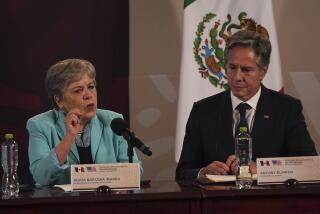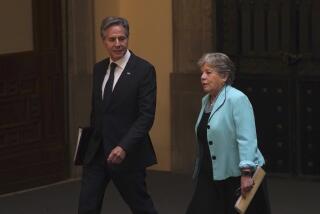Mexico Working to Avert Disaster on Foreign Debt
- Share via
WASHINGTON — Mexico’s finance minister and officials of international financial organizations are trying to fashion an agreement on loans to Mexico that will help the country avert financial disaster in the wake of its devastating Sept. 19-20 earthquakes.
The finance minister, Jesus Silva Herzog, met in Washington in the last few days with officials of the World Bank, Inter-American Development Bank and the International Monetary Fund in an effort to solve problems that surround loans from those organizations and Mexico’s $96.5-billion foreign debt--second only to Brazil’s $103 billion.
Silva Herzog also met with Treasury Secretary James A. Baker III on Friday before going to New York, presumably to talk with commercial bankers.
Talks ‘Are Going Well’
The IMF talks “are going well,” an IMF official said Saturday. He raised the possibility that Mexico may soon be able to draw on a scheduled IMF loan installment of $450 million. That “depends on how these talks go,” said the official, who spoke on the condition that his name not be used.
The IMF had blocked the $450-million installment of a total $4-billion loan because Mexico failed to meet economic targets in areas such as inflation, trade and expenditures. The move drew intense criticism because it was announced when news of the earthquakes was generating sympathy for Mexico around the world.
Thus, the fund is under some pressure to accommodate the Mexican government on the loan by modifying the targets. The official acknowledged that any discussions with Mexico “obviously will be influenced by the earthquake,” but he sought to minimize the connection, saying that because the country had failed to comply with IMF austerity measures for the quarter that ends Monday, Mexicans “had to talk about it.”
Meanwhile, several economists speculated Saturday that even if the IMF cuts off previously negotiated loans to Mexico, it will provide new disaster aid, which is available from both the fund and the World Bank.
“That way, they avoid the compliance issue,” said Raymond Dalio, president of Bridgewater Associates, an economic forecasting firm in Wilton, Conn. “The game is going to be to play for time.”
Any resolution of the IMF loan issue is crucial to Mexico because the posture of the IMF influences commercial lenders, on whom Mexico depends heavily. Mexican officials have said they will need $2.5 billion in commercial loans through the end of this year. And Dalio estimated that Mexico will need $4 billion in such loans next year to avoid a deep recession.
‘A Political Earthquake’
Walter W. Heller, former chairman of the Council of Economic Advisers in the Kennedy and Johnson administrations, said in a telephone interview from his home in St. Paul, Minn., that the agreement with the IMF “has to be modified in light of the earthquake damage and to avoid a political earthquake.”
Elaborating, Heller--now an economics professor at the University of Minnesota--said that if loans are withheld from Mexico, it could then “thumb its nose at us,” refusing to pay any of its debts, and thereby lead other nations to follow suit.
Indeed, Brazilian President Jose Sarney, in a July television speech, protested “exorbitant interest rates” levied by Brazil’s creditors and accused the IMF of “dogmatic intransigence” in imposing its austerity measures, contending that they led to unnecessary recession.
Heller asserted that such countries need looser restrictions on their loans to relieve economic pressure. “If anyone doesn’t hear the Latin American bomb ticking, then they’re deaf,” he said.
More to Read
Sign up for Essential California
The most important California stories and recommendations in your inbox every morning.
You may occasionally receive promotional content from the Los Angeles Times.










